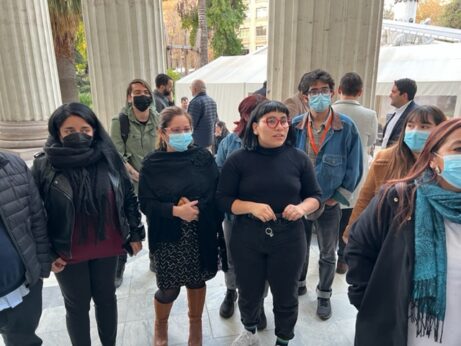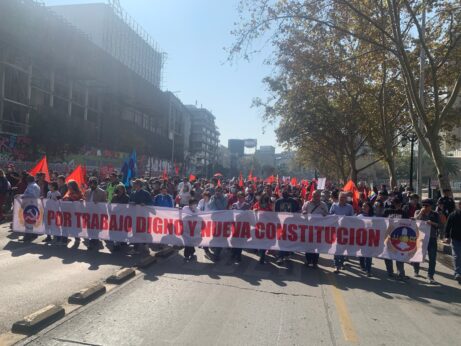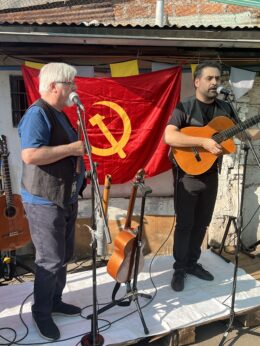
This is the third installment in a series of articles about the visit of the Hello Comrade Project to Chile in the spring of 2022. Hello Comrade is a group within the International Department of the Communist Party USA, a solidarity movement bringing together members of the party in the United States with members of fraternal parties throughout the world. The goal of is to promote friendship and learn from each other, but also to experience and document what it’s like to be a communist party member in other countries. Read Part 1 and Part 2 of this series.
SANTIAGO, Chile—On Oct. 6, 2019, as school let out across the Chilean capital, students made their way to the city subway stations to head home after a long day in the classroom. When they reached the turnstiles to pay their fare and enter, they were informed that the price of a single subway ride had increased by 30 Chilean pesos ($0.035 USD).
It was just the latest indignation, but it was too much. Long-simmering tensions over economic inequality, privatization, and cost of living, along with an increasing disillusionment with the right-wing government headed by Sebastian Piñera, created a volatile situation, where a seemingly small fee increase provided the catalyst for the Chilean class struggle to explode into a nationwide protest movement that would finally end the legacy of the 1973 Pinochet coup.
With its steady GDP growth and easy access to credit, Chile has long been hailed as a South American model for the successes of liberal free markets. For years, it was essentially the right’s showcase for unregulated capitalism. But just under the surface of the neoliberal economy are vast economic divides, poverty, debt, and economic hopelessness for the majority of Chileans.
Rather than accepting this final insult of a fare increase by the ruling elites, students refused to pay and initiated a protest movement that set into motion the final dismantling of the economic and political infrastructure of the Pinochet dictatorship.

Beginning in Santiago and spreading throughout the country, millions of Chileans took to the streets, bringing the country to a halt. Under pressure from the popular movements, on Nov. 19, 2019, the Chilean National Congress voted to hold a national referendum to create a new constitution replacing the 1980 one created by the fascist regime.
The people approved the creation of a new Constitutional Convention by 78%, and an election was held to elect delegates to the body. The convention is now in the process of drafting a new democratic constitution for the country, and there will be a popular referendum in September 2022 to ratify the final draft.
The Hello Comrade Project (HCP) was invited by the Communist Party of Chile (PCCh) to visit the historic proceedings of the Constitutional Convention as guests of the youngest constituent elected to the Convention, Valentina Miranda Arce, from the Communist Youth of Chile (JJCC). The Communist Party won seven seats to the Convention and participates in a coalition of allied leftist political parties within the proceedings.
The party is actively involved in the constitutional subcommittees for economic rights, democratic reform, Indigenous rights, women’s rights, and labor. The JJCC played an important role in the resistance to the fare hike that led to demands for a new constitution.
Not only was the JJCC influential in organizing the mass protest movement, but it was a 16-year-old member of the communist youth who, upon hearing of the transit fee increase, leapt on top of the turnstile entrance and implored her fellow students to resist the fees by climbing over the gates. It was this singular act of resistance that unleashed the floodgates and helped create a movement for change. The events of 2019 are filled with these instances of working-class courage where the students responded to the historic necessities of class struggle.

When the HCP group arrived, they were met by several members of Miranda’s team who provide research on the issues and help organize with the allied parties. They gave the group a tour and explained the history of the building where the meeting was being held. In a display of political symbolism, the Constitutional Convention chose to meet in the old National Congress building, which is the historic building where the congress and senate met until 1973 when it was closed by the Pinochet dictatorship after they halted all elections and nullified the 1920s-era constitution.
The turn-of-the-century neoclassical building is very similar to typical governmental architecture throughout the world, with its row of ornate columns organized along the front facade. The building occupies a full city block and is surrounded by a park-like setting with a garden filled with statues and other historic monuments. The current Chile National Congress meets in a new building in the coastal city of Valparaiso, and aside from its use as congressional offices and housing the Ministry of Foreign Affairs, this is the first political policy work carried out in the historic building since 1973.
The group happened to be at the Convention while delegates were voting in the main hall and were able to observe history in real time, to see how a democratic mass mobilization of people led to real democratic political change. The HCP group spent the afternoon meeting with the PCCh constituents and their staff and explored the grounds. The mood in the halls was extremely optimistic, and the constituents appeared both excited and conscious of the historic importance of the proceedings.
In an interview, Miranda explained:
“The new constitution for Chile is being written. This is the first constitution that is born from a social mobilization. It begins with the uprising of the year 2019 when the people of Chile came out and mobilized and took to the streets to demand an end to inequalities—mainly to end the neoliberal model. And what we are doing is finally dismantling those laws and that binding constitution that was left to us by the Pinochet dictatorship.”
Later, the HCP group attended the International Workers Day events scheduled for May 1st in the city center of Santiago at the Plaza Baquedano, which is now known as the “Plaza Dignidad.” The area was the center of the 2019 uprising and retains the alterations made to it by the revolutionary movement. Most noticeably, the ruins of former monuments commemorating the history of the powerful were partially removed during the protests. Their remains provide both a tangible and symbolic reminder that politics and ideology are transitory and can be quickly transformed when a broad people’s movement is empowered.
The subway entrance in the Plaza has been closed and converted into a memorial to the uprising, with a garden and murals honoring the 29 people who died there during the resistance. The area is a politicized space, and there are nearly nightly protests and marches that start there.

For May 1st, the HCP group planned to meet up with the JJCC to help paint a mural along the path of the march and participate alongside the PCCh contingent during the day. The night before May Day, though, the HCP created an impromptu banner to represent the Communist Party USA during the march. The colorful banner design was inspired by the local art of the Ramona Parra Brigade (BRP), and the group did their best to employ the style with its thick black outlines filled in with color. The center of the banner showed the planet Earth connecting the banner to the HCP’s mission of internationalism.
On the morning of May 1st, the group made its way to the Plaza Dignidad where thousands of people were lining up to celebrate International Workers Day. Adjacent to the plaza, the Gabriela Mistral Cultural Center is an arts center that was originally built by the Allende government and now serves as a venue for community theater, dance, and music. On the outside of the building, a long plywood wall was being used as a canvas for a roughly 40-foot-long mural being painted by the BRP.
The BRP now uses both the traditional brush and bucket paint and the newer aerosol paint borrowed from graffiti art. The HCP were thrilled to help paint the mural that all the May Day marchers would see as they passed the cultural center. The mural depicted a fist and spelled out “JJCC” and “BRP” and also said, “The Working Youth Continue to Approve,” referring to the drafting of the new constitution.
Helping with the mural and getting to know the communist youth in Chile was one of the many moments where the HCP concept, to learn from and share in the struggle with international comrades, was really put into practice.
The HCP group marched within the large PCCh delegation throughout the day. After being in the country and meeting with dozens of comrades, the HCP group participants already knew many PCCh members and were happy to get to see them again and march alongside the many familiar faces. The General Secretary of the PCCh, Lautaro Carmona, greeted the HCP, along with Recoleta mayor and PCCh presidential candidate, Daniel Jadue, who also connected with the delegation and marched with them for a section of the route. The march ended at a stage where labor leaders spoke about the need to keep struggling for workers’ rights and to support the new constitution.

After the march, the HCP group was invited to a fundraiser and party for International Workers Day. The event was in a health workers’ union hall with a large outdoor area that was shaded by cloth canopies that blocked the sun but let in light, creating a beautiful outside space perfect for the event. The hosts had a large raised barbeque pit with a huge cast iron skillet that cooked a communal Paella made with the local seafood.
Many of the comrades at the event came to the table of the HCP and gave them greetings. The group was surprised to see their friends from the Inti Illimani Chilean folk group also stop by to say hello and to see how the rest of their trip had gone after meeting them earlier in the week at the Chilean Writers Society.
Even better, the members of Inti Illimani grabbed their instruments and began to play many of their most loved songs of struggle, concluding with their classic anthem, “El Pueblo Unido.” With the crowd singing along and with fists in the air, “The people united will never be defeated,” described not just a theory, but the real life experience of the Chilean people as they forge ahead with the new constitution.
With a new democratic constitution in the works—a charter born out of the popular struggle in the streets and the failure of the neoliberal experiment to solve the basic needs of working people—the dream of Chilean socialism appears closer now than ever.










